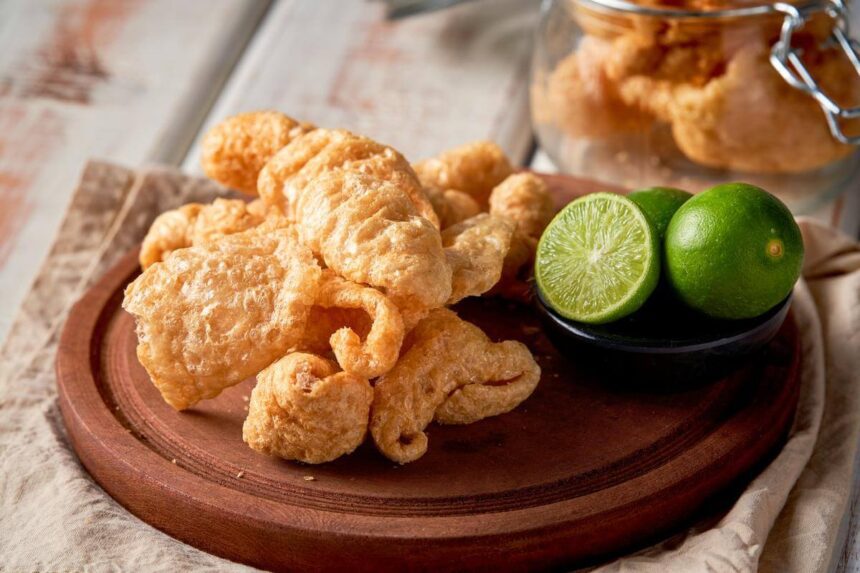Hey there, fellow cat lovers! We’re here to tackle a purrplexing question today: Can cats indulge in the salty, crunchy delight of pork rinds? Picture your furry friend perched on the couch beside you, eyes wide with curiosity, as you savor these savory snacks. Should you share a piece with them, or is it best to keep the porky goodness all to yourself? Let’s dig into this tasty topic and find out!
The Catty Culinary Conundrum
The Carnivorous Nature of Cats
First things first, let’s remember that our feline friends are true carnivores. Their ancestors were wild hunters, stalking their prey in the great outdoors. Even though our domesticated furballs have traded their wilderness for cozy homes, their dietary needs remain rooted in their primal nature. A cat’s diet should primarily consist of high-quality meat, packed with essential nutrients and proteins.
Pork Rinds: A Snack from the Swine
Now, let’s talk about pork rinds. These crispy treats are made from fried or roasted pig skin, resulting in a crunchy, crackling texture. While they might be a mouthwatering temptation for us humans, we have to consider whether they align with our whiskered companions’ dietary requirements.
Pork Rinds and Purrfection – What’s the Verdict?
The Pros and Cons of Pork Rinds
Pork rinds are rich in protein, which is an essential building block for our feline friends. However, they also tend to be high in fat and salt content, which can lead to potential health issues for our kitties. Excessive salt intake can put strain on their kidneys, while too much fat can cause digestive disturbances or even pancreatitis.
The Bottom Line: Tread with Care
While pork rinds might have some nutritional benefits for our cats, it’s important to exercise caution when considering sharing them as a snack. Moderation is key! Occasional nibbles of pork rinds won’t do any harm, as long as they are free from seasonings, additives, or excessive salt. However, it’s always best to consult with your veterinarian before introducing any new food to your feline friend’s diet.
Whetting Your Kitty’s Appetite – Safe Alternatives
Pawsitive Pawlicies for Snacks
If you’re looking for a safe and satisfying snack for your kitty, there are plenty of options to explore. Here are a few feline-friendly alternatives to consider:
- Lean Cooked Meats: Offer your cat small portions of lean, cooked meats like chicken or turkey. Remember to remove any bones or skin and avoid seasoning.
- Cat-Specific Treats: Check out the wide variety of specially formulated cat treats available in pet stores. These treats are designed to meet your cat’s nutritional needs while offering a tasty reward.
- Freeze-Dried Delights: Freeze-dried meat treats are a fantastic option that provides the goodness of meat in a convenient and safe form.
FAQ
What should I do if my cat accidentally eats a large amount of pork rinds?
If your cat accidentally consumes a significant amount of pork rinds, monitor them closely for any signs of discomfort, digestive issues, or unusual behavior. If you notice any concerning symptoms, contact your veterinarian for guidance and appropriate medical care.
Can pork rinds cause allergies in cats?
While it is possible for cats to have allergies, pork rinds themselves are not a common allergen for cats. However, individual cats may have specific sensitivities or allergies to certain ingredients or seasonings commonly found in pork rinds. If you suspect your cat has an allergy, it’s best to consult with your veterinarian for proper diagnosis and guidance.
Are there any health benefits to feeding pork rinds to cats?
While pork rinds contain protein, which is essential for cats, they are not the most ideal source of nutrition for feline health. There are other options, such as lean meats or cat-specific treats, that provide a more balanced and beneficial nutritional profile for your furry friend.
Can kittens eat pork rinds?
It’s generally not recommended to feed pork rinds to kittens. Kittens have specific dietary needs for their growth and development, and their delicate digestive systems may not handle the high fat and salt content of pork rinds well. It’s best to focus on providing them with a balanced kitten food recommended by your veterinarian.
How can I satisfy my cat’s craving for crunchy snacks without giving them pork rinds?
Cats often enjoy the crunchiness of snacks. To satisfy their cravings, you can offer them safe alternatives such as commercially available cat treats designed to provide both nutrition and texture. You can also try freeze-dried meat treats or offer small pieces of raw, crisp vegetables like carrot or cucumber (ensure they are safe for cats and suitable for their digestion).
Are there any other human foods that cats should avoid?
Yes, there are several human foods that can be harmful to cats. Some common examples include chocolate, onions, garlic, grapes, raisins, caffeine, alcohol, and certain artificial sweeteners like xylitol. It’s important to familiarize yourself with a comprehensive list of foods that are toxic to cats and ensure they are kept out of your feline friend’s reach.
Conclusion – Tummy and Taste Buds at Peace
So, can cats eat pork rinds? In moderation, they can enjoy a little taste, but it’s essential to be mindful of the potential risks associated with excessive salt and fat content. Remember, your cat’s well-being should always take precedence over sharing snacks. When in doubt, consult your veterinarian for guidance on the best dietary choices for your beloved feline companion.
As responsible pet owners, we strive to provide the best care and nourishment for our whiskered wonders. While pork rinds might not be the ideal choice for our cats, there are numerous cat-approved options available to satisfy their taste buds while keeping their health in check. Treat your furry friend to a delicious and nutritious snack that will make their purrs rumble with delight!
Now, go forth and explore the world of cat-friendly treats. Your feline friend will thank you with a meow of approval!



